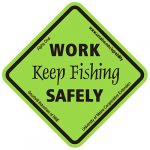Aging and Fishing
Written by Brie Weisman, OT- FishAbility
Aging is inevitable. How you age is up to you.
With the average age of commercial fishermen being 40 years old, it’s incredible to know there are few still fishing at 100 years old. You may suspect centenarian fishermen of having good genes, but they also do a few things right.
You too can improve your odds of not only fishing as long as you’d like but staying healthy and comfortable along the way. Here is a bottom-to-top guide to keeping an aging body fishing.
- Feet. Make sure you are wearing the right size shoes – as we age, our feet can lengthen due to falling arches. Bunions, hammertoes, and crossed toes can increase pain and affect ambulation. Explore simple, inexpensive corrective products with your doctor.
- Legs. Knees and ankles lose elasticity as we age. To reduce pain and the likelihood of future surgery, do squats and range of motion (ROM) exercises. Maintain a healthy weight to reduce joint strain.
- Bladder. Aging naturally leads to increased urination. Drinking less is no solution because it can shrink the bladder size, increasing the number of trips to the bathroom. Specific exercises can improve bladder control.
- Back. The most common physical complaint of fishermen is back pain. Aging causes discs to thin, reducing our height and causing poor postures. ROM exercises, stretching, yoga, back and abdominal exercises all strengthen the back, improve posture, and alleviate pain.
- Shoulders. Rotator cuff injuries, bursitis, and arthritis, common to fishermen, are painful and limit ROM. Over long periods, reduced ROM and guarding against pain can decrease strength. To help prevent injuries and aid in faster recovery practice strength training and ROM exercises.
- Hands/Wrists. As we age, bones slightly thicken and cartilage tends to thin. Arthritis often stiffens joints, and cold, wet environments increase arthritic discomfort. Dexterity also begins declining after age 60. ROM exercises and activities like playing music, knitting, and whittling, along with the use of moist heat, can ease symptoms.
- Mouth. Studies link oral health and overall health, and the number of teeth we have later in life is significantly correlated to life expectancy. Brushing, flossing, dental check-ups, and limiting sugars are as important for the ‘over fifty’ crowd as they are for children.
- Skin. Our largest organ takes a lot of abuse, especially at sea. Aging skin thins, injures easier, and recovers slower, increasing opportunities for infection. As we age, we feel colder from reduced circulation, and a slower metabolism. Gloves, protective clothing and sunscreen are more important than ever.
- Eyes. 60% of people over age 40 need reading glasses. Peripheral, color, and night visions all weaken with age, increasing the risk of accidents, see an optometrist regularly. And remember: solar radiation is a primary cause of cataracts and age-related macular degeneration-the leading cause of blindness. Wear UV-rated sunglasses, especially on the water!
- Ears. Hearing loss begins mid-life. It is more than a nuisance, sometimes contributing to depression and dementia when ignored. Unaddressed on a boat it is a hazard. See an audiologist regularly.
- Brain. There is a scientific correlation between healthy bodies and healthy minds. Physical exercise improves blood circulation essential to brain health. Physical activity stimulates multiple regions of the brain. Pursue new, intellectually stimulating activities. Play an instrument. Stay social. Manage stress.
